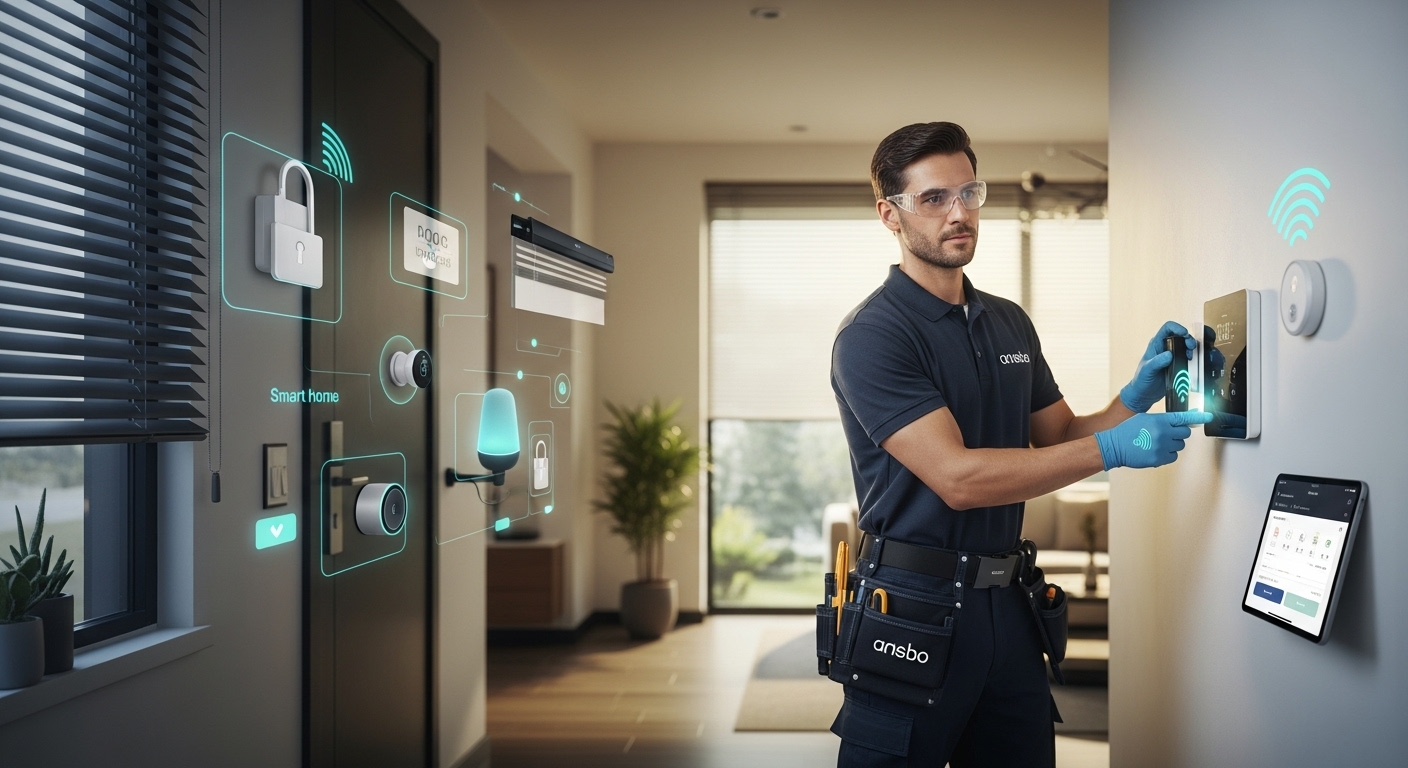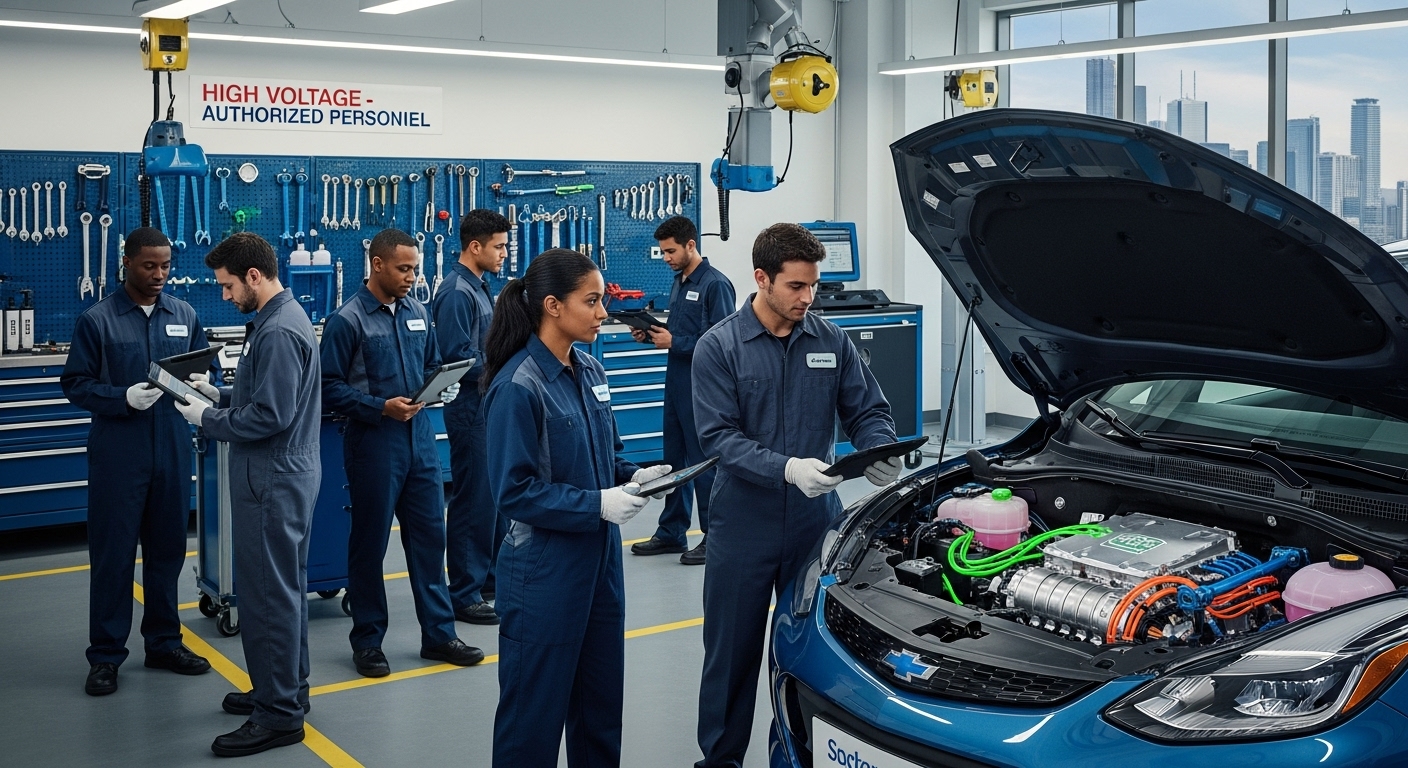Smart Home Installer Training in Toronto – Certification & Courses

A Smart Home Installer is a trained professional who designs, installs, and maintains connected home systems — from smart lighting and thermostats to home security cameras, voice assistants, and even EV chargers. In simple terms, they bring automation to life in Canadian homes, making everyday living more efficient, secure, and energy-smart.
As more homeowners across Canada embrace IoT (Internet of Things) and sustainable tech, the demand for skilled smart home installers has skyrocketed especially in major cities like Toronto, Vancouver, and Calgary.
Whether you’re an electrician, technician, or someone looking to upskill for the tech-driven trades of the future, smart home installation is one of the most exciting and profitable paths to explore today.
Why Smart Home Installation Is in Demand in Canada
Canada’s housing and energy markets are evolving fast. According to industry data, over 60% of Canadian households plan to adopt smart home devices by 2027, driven by energy efficiency goals, government green incentives, and a growing awareness of digital comfort.
In Toronto alone, new condos, home renovation projects, and custom builds increasingly include smart wiring and home automation systems — creating steady demand for certified smart home installers who understand local standards and safety codes.
Why You Should Read This Guide
If you’re based in Toronto or anywhere in Canada and want to break into the smart home industry, this guide will show you exactly how to start, from choosing the right certification courses to understanding Canadian licensing requirements and finding your first clients.
You’ll learn:
Where to find the best smart home installer courses in Toronto
Which certifications matter most in Canada (like CEDIA, ESA, and KNX)
How much you can expect to earn and what career paths are available
Government funding and training grants that can help you get certified faster
So, whether you’re looking to launch a new career, upgrade your skills, or start a local smart home business, this post will help you take the next confident step toward becoming a certified Smart Home Installer in Canada.
Smart Home Technology in Canada
If you’ve noticed more homes in Toronto showing off things like video doorbells, voice-controlled lights, or smart thermostats, you’re not imagining it, smart home technology is booming in Canada.
According to recent market reports, the Canadian smart home industry is expected to grow steadily, driven by demand for energy efficiency, convenience, and security.
Growth of Smart Homes in Canadian Cities
Cities like Toronto, Vancouver, and Calgary are leading the way, thanks to a mix of tech-savvy homeowners and newer condos being built “smart-ready.” Builders are now wiring homes with systems that support automation from day one — everything from smart lighting and HVAC to IoT-connected appliances.
Even in smaller cities like Halifax or Winnipeg, you’ll find growing interest as homeowners upgrade older houses to support smart thermostats, security cameras, and voice assistants like Alexa and Google Home.
Smart Home Systems in Demand
Here in Toronto, the most requested smart home installations include:
Smart security systems (cameras, door locks, and alarms)
Smart lighting with app or voice control
Home energy management systems tied to solar panels or EV chargers
Climate control systems (smart thermostats, HVAC automation)
Entertainment systems like whole-home audio or smart TVs
With homeowners seeking comfort, safety, and lower energy bills, it’s no wonder the demand for trained smart home installers is rising fast.
Smart Home Installer Training in Toronto
If you’re thinking about becoming a smart home installer, Toronto is one of the best places to get started. The city has a strong tech ecosystem, a thriving construction scene, and several institutions offering both hands-on and online training options.
What You’ll Learn
Most programs are designed to give you a mix of technical skills and real-world experience. Expect to learn:
Wiring and networking fundamentals
IoT device setup and integration
System configuration for lighting, HVAC, and security
Troubleshooting and client setup support
Courses often include practical labs where you’ll actually install smart devices and connect them into a unified home automation system.
Hands-On vs. Online Training Options
If you’re a beginner or coming from another trade (like electrical or IT), hands-on training is invaluable.
Colleges like George Brown and Humber offer in-person labs that simulate real homes, giving you direct exposure to wiring, configuration, and system design.
For those who prefer flexibility, online programs from providers like Smart Home School Canada or Automation Training Centre (ATC) let you learn at your own pace great if you’re already working full-time or outside Toronto.
Duration and Typical Costs
Short courses: 2–4 weeks, focusing on basic installation and configuration.
Diploma programs: 6–12 months, offering deeper technical and electrical training.
Costs: Range from $800 to $5,000, depending on the program type and certification level.
Top Smart Home Installer Courses in Toronto
Toronto offers some of the most diverse training options in Canada — from college-level certificates to private industry training.
Community Colleges
George Brown College – Smart Building Technologies
One of Toronto’s most respected technical programs. The course covers IoT systems, automation, and energy-efficient building technologies. Students gain hands-on experience with tools used by real smart home professionals.Centennial College – Electrical Engineering Technician (Automation Stream)
While not exclusively about smart homes, this program provides a solid electrical and automation foundation, ideal if you plan to specialize in smart installations later.Humber College – Home and Building Automation Courses
Humber offers continuing education programs that focus on integrating HVAC, lighting, and control systems, perfect for tradespeople transitioning into smart home work.
Private and Online Training Providers
Smart Home School Canada (Online)
Offers a beginner-friendly smart home installer certification that’s 100% online, recognized by several Canadian employers. The course includes modules on system design, security integration, and automation software.Automation Training Centre (ATC) – Mississauga
Provides professional-grade courses in industrial and residential automation. They’re known for practical labs and smaller class sizes.Control4 & Lutron Authorized Training
If you’re interested in premium home automation systems, Control4 and Lutron both offer certified installer programs. These are great for professionals who want to work with high-end clients or home builders.
Expert Tip from a Local Pro
If you’re based in the GTA like me, start with a short certification program to get familiar with the technology, then build your portfolio by helping friends or clients set up smaller systems.
Most successful installers in Toronto began by combining formal training + hands-on experience, then partnered with smart home suppliers or builders for steady work.
Certification Pathways for Smart Home Installers in Canada
If you’re planning to become a smart home installer in Toronto, the good news is there’s a clear pathway to get certified and trusted by clients.
While there’s no single “Smart Home Installer License” in Canada, employers and homeowners want professionals who understand both electrical safety and home automation systems.
Here’s how most Canadian installers get certified:
Electrical Safety Authority (ESA) Licensing (Ontario):
In Ontario, any electrical work, including smart lighting, EV chargers, and home automation, requires ESA certification. You can’t legally wire devices without it. Many smart home installers partner with or become licensed electricians (309A Red Seal) to meet this requirement.Red Seal Endorsement:
The Red Seal Program is recognized across Canada and shows you meet national trade standards. Even if you focus on automation, having this endorsement boosts your credibility and income potential.CEDIA Certification (Custom Electronic Design & Installation Association):
CEDIA is like the “gold standard” in the smart home world. Their ESC (Electronic Systems Certified) credentials prove you’re skilled in designing, installing, and maintaining integrated home systems. It’s especially valuable if you plan to work with high-end Toronto clients or automation brands like Control4 or Lutron.Manufacturer-Specific Certifications:
Companies like Lutron, Control4, Crestron, and KNX offer online and in-person certifications. These focus on system setup, troubleshooting, and programming — perfect for upgrading your skills while you work.
So, if you’re serious about a long-term career, start with your ESA and CEDIA pathways, they open doors across Ontario and beyond.
Pre-Requisites & Skills Needed
Smart home installation is a mix of hands-on electrical work, tech configuration, and client communication. If you’re coming from an electrician, IT, or security background, you already have a head start.
Here’s what you’ll need to succeed:
Basic Electrical Knowledge:
Even if you’re not yet licensed, understanding wiring, load capacity, and circuit protection is key. You’ll work with electricians often, so speaking their language helps.Networking & Connectivity Skills:
Most systems rely on Wi-Fi, Ethernet, or Zigbee/Z-Wave protocols. Knowing how to configure routers, troubleshoot connectivity issues, and integrate devices smoothly makes you stand out.Customer Service & Problem-Solving:
Toronto homeowners love convenience but expect professionalism. Being patient and explaining tech setups in plain English goes a long way.Health & Safety Awareness:
Follow Ontario Health and Safety Act (OHSA) standards and stay compliant with ESA codes — especially when installing smart thermostats, cameras, or lighting that ties into the home’s wiring.
Career Paths & Salary Expectations in Toronto
Smart home tech isn’t just trendy, it’s a solid career move in Toronto. With more homeowners embracing automation, there’s high demand for skilled installers.
Here’s what the career landscape looks like:
Entry-Level Roles:
If you’re starting out, roles like Smart Home Technician Assistant or Installer Apprentice pay around $22–$28/hour. Many employers offer training while you work.Certified Installers & Specialists:
Once you have your certifications and experience, salaries jump to $60,000–$80,000 per year — especially if you work with premium brands or handle complex setups.Independent Contractor or Business Owner:
Many Torontonians start their own home automation business after 3–5 years. Freelance installers can earn $100/hour or more on large projects.Industries Hiring in Toronto:
Smart home automation companies (e.g. Smart Haven by Telus, Vivint)
Electrical contractors
Real estate developers integrating smart tech into condos
Renewable and EV charger installation companies
With sustainability and home energy management on the rise, the career outlook is extremely positive for tech-savvy installers in the GTA.
Funding & Financial Aid Options
Training can get expensive, but luckily, Ontario and Canadian programs help cover costs for trades and tech upskilling.
Here are a few real options to explore:
OSAP for Apprentices:
If you’re enrolling in a certified trades program, you can apply for the Ontario Student Assistance Program (OSAP), it’s not just for university students. It covers tuition and tools.Skills Development Fund (SDF):
The Ontario government launched this to help workers transition into in-demand fields, including electrical and automation technologies. Some smart home training programs partner directly with SDF to offer subsidized fees.Apprenticeship Grants:
Federal programs like the Apprenticeship Incentive Grant (AIG) and Apprenticeship Completion Grant (ACG) give up to $4,000 total for completing trade certifications like the Red Seal.Employer-Sponsored Training:
Many Toronto-based automation companies invest in training for their technicians. If you’re employed, ask your HR department, you might get certified while getting paid.
Even small investments in training can pay off fast, most installers recover their costs within their first year of work.
Smart Home Installer Associations & Networking in Canada
Like any trade, networking is key, and in smart home tech, it’s also how you stay current.
Here are some great communities and associations to connect with:
CEDIA Canada:
Offers online courses, annual expos, and certification programs. Their Canadian division connects you with local integrators, product vendors, and mentors.Canadian Home Builders’ Association (CHBA):
CHBA often features smart home solutions at its events. It’s a great way to meet builders who might subcontract installers for new developments.Toronto Tech & IoT Meetups:
Platforms like Meetup.com host Toronto-based groups focused on IoT, automation, and sustainability. These are excellent for making contacts and finding collaboration opportunities.LinkedIn & Facebook Groups:
Search for “Smart Home Professionals Canada” or “Canadian Electricians & Automation Techs.” You’ll find a lot of peer support and job postings.
Being active in these networks helps you find new contracts, stay ahead on tech trends, and grow your reputation as a trusted professional in Toronto’s smart home scene.



